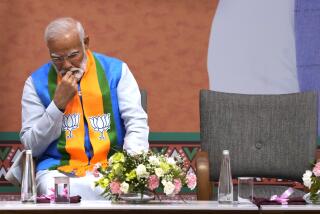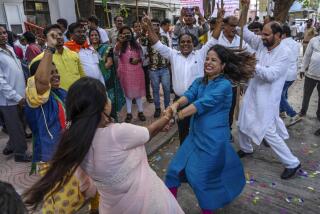INDIA : Rao’s Star, Far From Burning Out, Remains on the Rise
- Share via
NEW DELHI — Astrologer Sushil Chaturvedi has seen it clearly in the stars: Prime Minister P.V. Narasimha Rao and India’s ruling party, the Congress (I), are headed for disaster in the next general election.
“I’m not God, but 90% of what I predict comes true,” adds the Bombay-based seer, whose horoscopes are given a national audience in the Times of India.
The 74-year-old prime minister’s problem, Chaturvedi explained in an interview, is that he is a Cancer, while India, which gained independence at midnight on Aug. 15, 1947, is a 48-year-old Leo. “Their charts are not compatible any longer,” Chaturvedi direly concludes. “The prime minister’s Saturn has entered into Scorpio, which is a bad sign.”
A few months back, many earthbound political analysts in India would have concurred. But not now. The apparent No. 1 political victim of Congress (I) routs in recent key state elections, Rao has not only survived, he seemingly has prospered.
“Congress is the only party that remains a truly national party,” said professor Susheela Kaushik, chair of the political science department at the University of Delhi.
By next July, voters in the world’s most populous democracy must be called to the polls to choose a new parliament and government. For most Western investors and companies, a Congress (I) win would be the firmest guarantee that the economic liberalization policy launched by Rao after he took office on June 21, 1991, will continue.
Finance Minister Manmohan Singh said as much Monday, when he told an economic forum in New Delhi that further serious reforms in India’s notoriously inefficient public sector will have to wait for the “new government.”
What seems to have smiled upon Rao is, paradoxically, the success of the ruling party’s chief rival in state elections last winter and spring. Since then, the Hindu nationalist Bharatiya Janata Party, or BJP, has faced an embarrassing mutiny in its ranks in Gujarat, has ditched the government it was supporting in Uttar Pradesh and has been plagued with an unruly coalition partner in Maharashtra.
“The BJP, supposed to have tremendous discipline, has now shown that it has feet of clay, that it is a party like any other, that there is factionalism,” Kaushik said.
Meanwhile, a revolt in the ruling party itself, led by Arjun Singh, the former No. 2 in Rao’s Cabinet, has fizzled like a damp firecracker.
Bottom line: The un-charismatic Rao, drafted as a stopgap prime minister after the murder of Rajiv Gandhi by a suicide bomber on May 21, 1991, remains the dominant figure on India’s political landscape.
It is doubtful, however, that his party, which now holds 255 of the 545 seats in the lower house of India’s Parliament, can win an outright majority next time around. Congress (I) is tarred with the brush of corruption, is charged by critics with arrogance and has alienated many Muslim and lower-caste Hindu voters.
Although the party may not romp home, it looks able to limp. After the ballots are counted, many pundits now believe that the party that steered the anti-colonial struggle against the British Empire will remain India’s largest, perhaps with 170 to 190 seats, and will be able to form a governing coalition or seek outside support.
*
As the campaign looms, Rao and his camp are shoring up their positions. A Congress (I) youth group rally in the capital last weekend became a love fest for Rao, when organizers put up the same giant, painted effigies of the prime minister that are usually reserved for film stars in his native South India.
Rao met recently with Gandhi’s politically popular widow, Sonia, and huddled Monday with a former rival to try to restore unity to the ruling party’s Bombay-based chapter. The same day, Home Minister Shankarrao Bhaorao Chavan unexpectedly in Parliament accused the United States of being partly responsible for the 6-year-old separatist revolt in Jammu and Kashmir.
A U.S. Embassy spokesman said the charges had “absolutely no basis.” One Indian periodical editorialized that Rao’s home minister was “guilty of playing to the gallery”--and, most probably, to the electorate as well.
More to Read
Sign up for Essential California
The most important California stories and recommendations in your inbox every morning.
You may occasionally receive promotional content from the Los Angeles Times.













